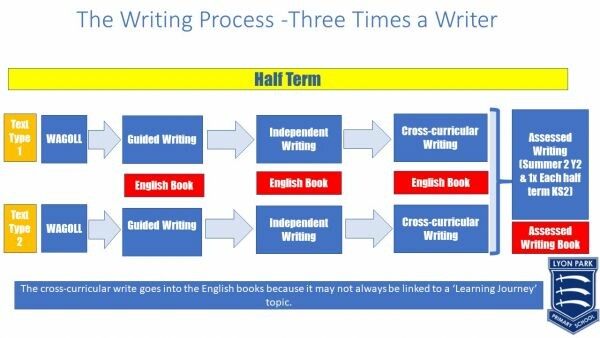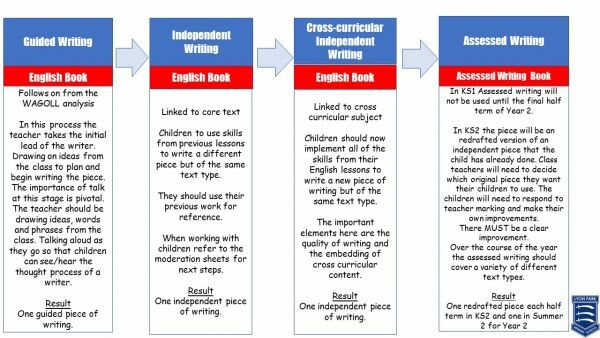English Writing
AIMS
1)To foster an enjoyment of writing amongst pupils, and recognition of its value through:
- Providing a stimulating curriculum and school environment, which places the development of Writing skills at its heart.
- Providing meaningful contexts and quality texts as the inspiration for writing.
2)To ensure the teaching of Writing is effectively planned, and responsive to learners’ needs, through:
- Planning the teaching of both Writing composition and Spelling, Punctuation and Grammar (SPAG) in conjunction with the National Curriculum statements as appropriate for the age / ability of the children.
- Employing effective assessment procedures (both formative and summative)
3)To best enable the development of writing skills, through preceding Writing with quality Speaking and Listening /Drama activities using Power of Reading activities to support.
4)To maximise the progress of pupils through teaching Writing to learning-focussed objectives
5)To provide pupils with a clear model for how to meet lesson objectives and thereby become effective writers through delivering:
- Clear and regular teacher modelling of the writing processes and standards required.
- Interactive and engaging Guided Writing sessions
- Independent Writing sessions where children have clear targets and expectations.
6)To enable pupils to understand how to improve their writing through timely and effective feedback.
7)To create a culture of continuous improvement amongst staff at Lyon Park, in which:
- Teachers and TA’s engage in regular CPD and dialogue around best practice in the teaching of Writing.
- Teaching staff are able to access support and clearly modelled examples of high quality teaching and outcomes.
INTENT
At Lyon Park we strive to help our children develop into imaginative and effective communicators both verbally and in written form.
Our aim is to ensure children are well equipped for life beyond school by providing them with opportunities to write for a range of purposes and audiences underpinned by a culture of high expectation in content and presentation.
IMPLEMENTATION
Planning:
All planning should follow the medium term plan in English where core Power of Reading books and writing genres can be acquired. The planning should follow a sequence of lesson which promote independence and acquiring the necessary skills to achieve the best possible outcomes. In order to to this the school uses a bespoke approach called Three Times a Writer with embedded immersion activities. The sequence should be as follows:

EYFS
Literacy includes Reading and Writing. Literacy is taught through quality texts as well as daily phonics sessions. Developing speaking and listening skills is at the heart of developing literacy. Teaching must include planning opportunities to develop vocabulary and talk. Each text is studied for two weeks to ensure pupils can understand and recall it. Purposeful and meaningful links to writing are made. It is important that children see practitioners modelling writing, and also see themselves as writers. This will begin with mark marking.
The learning environment must have opportunities to practise, rehearse and apply skills taught during phonics lesson. Banded books are used to teach children how to read. Guided reading is introduced during the Spring term.
The learning environment must be literacy rich, this includes an attractive book corner, a print rich environment, literacy based activities in the provision and a stimulating writing area.
Phonics is taught daily in Nursery and Reception. Nursery will focus on the seven aspects in Phase 1. The overarching aim is for children to experience regular, planned opportunities to listen carefully and talk extensively about what they hear, see and do. In Reception, phonics is taught daily. Children work through Phases 2-4. Groups are streamed so pupils are taught at the correct level.
Teaching:
Teachers must read all core texts in advance before they plan and have a sound understanding of the book. This will help them plan the required reading skills tasks prior to planning.

Organisation:
- All children have one writing session each day. As part of the schools collapsed curriculum in Autumn 2020 children will have five English Writing lessons plus an extra EGPS lesson in Years 1-6
IMPACT
Assessment:
-
Half termly phase moderations using the school’s progressive assessment documents.
-
Pupil outcomes assessed against Target Tracker objectives.
-
Summative assessment indicates progress made at key assessment points for grammar and spelling. These include PIRA tests.
Monitoring and evaluation:
-
Monitoring includes the literacy book looks and planning scrutinise by the English leaders and SLT.
-
Pupil and teacher interviews are also conducted to evaluate the effectiveness of the models.
-
Moderation outcomes
-
Writing Review Days in partnership with the Local Authority.
Please see links below for further information.

